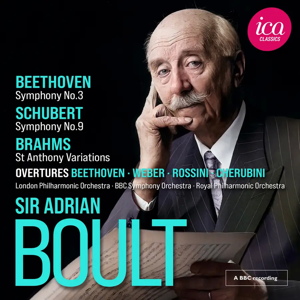
Sir Adrian Boult (conductor)
Ludwig van Beethoven (1770-1827)
Symphony No. 3 in E flat major, Op. 55 ‘Eroica’ (1804)
Consecration of the House Overture, Op. 124 (1822)
Johannes Brahms (1833-1897)
St Anthony Variations, Op. 56a (1873)
Franz Schubert (1797-1828)
Symphony No. 9 in C major, D.944 ‘The Great’ (1827)
Carl Maria von Weber (1786-1826)
Euryanthe Overture (1823)
Gioachino Rossini (1792-1868)
La scala di seta Overture (1817)
Luigi Cherubini (1760-1842)
Anacréon: Overture (1803)
rec. 1963-1977
ICA Classics ICAC5179 [2 CDs: 153]
All these performances are appearing for the first time on CD though I’ve been burned often enough to add that this is ICA’s claim not mine. I have no reason to doubt it, however.
The recordings date from 1963 (Cherubini) to 1977 (Schubert), though the main focus is on Boult’s last years as a performing and recording artist, between 1972 and 1977, when he proved a frequently incendiary exponent of even tried and tested British material. There is none of that repertoire here in a twofer that focuses on Classical and Romantic canonic repertoire.
There are two major symphonies, the ‘Eroica’ and Schubert’s ‘Great’. The Eroica (May 1972, from the Royal Festival Hall) is with the LPO, the orchestra with which he’d already recorded it commercially twice, the first time in 1957 and again in 1961. There are no major deviations from his accustomed way with it – not in the way that there could be with his approach to symphonic Vaughan Williams, for example, at around the same time. As usual, he omits the first movement repeat, and his cultivation of antiphonal writing is clear at the climax of the movement, in particular. The clear, cool acoustic allows the trumpets to flare persuasively and for the percussion strongly to be heard; nothing muffled here. Boult is much quicker than his Beethovenian guiding light, Weingartner, in the funeral march, where his double basses reveal, yet again, that his orchestral sonority was never lightweight; rather it was properly rich, something not always clear from his Decca commercial discography. This is a punchy reading, the winds rightly given their head in the finale, though perhaps not quite to a Klemperer-like extent. Tiny smudges from the horns apart this is a committed, powerful reading.
Schubert’s ‘Great’ was always a known repertorial strength of Boult’s. He remained clear-sighted and architecturally long-breathed in this work which he had first recorded in 1934 with his BBC Symphony forces, again in 1954 and finally in 1972 with the LPO – a recording much prized by British critics. Like the Eroica, there’s no first movement repeat but he generates a well-nigh perfectly paced reading with the BBC Symphony, the opening movement properly triumphant but its ending judiciously balanced, the brass audible, of course, but not overbalancing the strings.
One of the selection principles of the release must surely have been the opportunity to hear Boult paired with a wide variety of British orchestras – the BBC Scottish and Welsh orchestras are represented as well as the LPO and RPO and BBC Symphony – as well as discographic expansion, as we critics rather pompously put these things. Rossini’s overture to La scala di seta and Cherubini’s to Anacréon are the two novelties here and both are finely played.
Two works that Boult had recorded before are Beethoven’s Consecration of the House Overture, recorded here in the BBC’s Cardiff studio in which the work’s proto-nobilmente quality are brought out and Brahms’ Variations on a Theme of Haydn, recorded here with his old orchestra in 1976. He’d earlier recorded it in 1954 and 1977, both times with the LPO. Monteux’s recording was the first one I heard and for me the 1977 Boult came next. I’m not quite sure why his excellent Brahms symphony cycle has fallen away, critically-speaking – probably there’s too much competition these days.
Martin Cotton is a knowledgeable writer about Boult and has written the fine booklet notes. The remastering is in the safest of hands: Paul Baily.
Given the existence of other recordings of most of this material, I can’t, in all honesty, blithely recommend you buy this twofer. You have demands on your wallet and on your time. But these are fine late examples of Boult’s sagacious way with the nineteenth-century repertoire and he shows unflagging commitment and expertise throughout.
Jonathan Woolf
Buying this recording via a link below generates revenue for MWI, which helps the site remain free.


Contents
Ludwig van Beethoven (1770-1827)
Symphony No. 3 in E flat major, Op. 55 ‘Eroica’ (1804)
London Philharmonic Orchestra
rec. Royal Festival Hall, 10 May 1972
Consecration of the House Overture, Op. 124 (1822)
BBC Welsh Orchestra
rec. Broadcasting House, Cardiff, 19 June 1973
Johannes Brahms (1833-1897)
St Anthony Variations, Op. 56a (1873)
BBC Symphony Orchestra
rec. Maida Vale Studios, London, 3 October 1976
Franz Schubert (1797-1828)
Symphony No. 9 in C major, D.944 ‘The Great’ (1827)
BBC Symphony Orchestra
rec. Royal Festival Hall, 2 March 1977
Carl Maria von Weber (1786-1826)
Euryanthe Overture (1823)
BBC Welsh Orchestra
rec. Broadcasting House, Cardiff, 22 June 1973
Gioachino Rossini (1792-1868)
La scala di seta Overture (1817)
BBC Scottish Symphony Orchestra
rec. Broadcasting House, Glasgow, 4 August 1973
Luigi Cherubini (1760-1842)
Anacréon: Overture (1803)
Royal Philharmonic Orchestra
rec. Royal Festival Hall, 8 March 1963

















